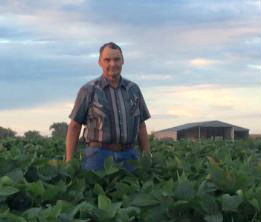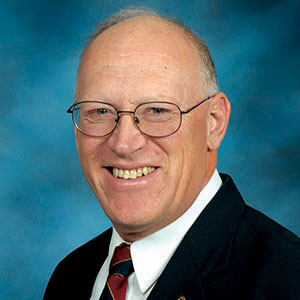Kansas Profile – Now That’s Rural: Randy Bunnel, community volunteer
Oct. 28, 2020
By Ron Wilson, director of the Huck Boyd National Institute for Rural Development at Kansas State University.
“We make a living by what we get. We make a life by what we give.” That quote attributed to Sir Winston Churchill might be a good way of describing Randy Bunnel and the many other selfless volunteers who support our rural communities. Randy’s community service earned him a nomination as an Ag Hero for the Kansas Department of Agriculture’s 2020 Ag Growth Summit.
At right: Randy Bunnel | Download this photo.
Randy Bunnel grew up on a farm in southern Anderson County. He earned a bachelor of science degree in agricultural education at K-State and a master’s degree a year later. He also met his wife Betsy who was majoring in elementary education. They moved back to his family farm.
“She started teaching, and I started farming,” Randy said. He and Betsy got involved with the Kansas Farm Bureau Young Farmer and Rancher Committee. Today, Betsy is a reading recovery teacher and half-time assistant principal at the school in Garnett.
As a third-generation farmer, Randy oversees the Bunnel farming operation, which now includes row crops of corn, wheat, soybeans and putting up hay for his 75-head cow-calf herd. The nomination form for Randy said, “His farming is a 365-day per year calling for him.”
Randy’s farm is located three miles south of the rural community of Welda, population 129 people. Now, that’s rural.
Rural communities, by their nature, do not have big-city budgets. They depend on the work of volunteers. Those volunteers may serve on the fire department, work as township trustees, assist with church functions, volunteer with the PRIDE committee, maintain the country cemetery, or otherwise provide valuable service to their neighbors and their community – often with minimal or no compensation whatsoever.
Randy Bunnel recognized the importance of such volunteer service. His father had served on a couple of boards, and Randy followed that example.
Randy now serves on the 4 Rivers Rural Electric Co-op board of directors. He has completed courses for National Rural Electric Cooperative Association certification of Credentialed Cooperative Director, Board Leadership and the Director Gold Credential. He is on the board of the Anderson County Rural Water District No. 5, Anderson County Farm Bureau, Anderson County Soil Conservation Service Committee and faithfully attends Iola First Christian Church.
Randy knows the challenges of rural areas firsthand. “For one thing, we need better internet service in rural areas,” he said. Other services are important as well.
“Almost 20 years ago, our local fire station (volunteer team) was down to two or three members,” Randy said. Of course, those fire stations are vital for the protection of families and homes, and it is essential that they be fully staffed when needed.
“The assistant fire chief asked me to join, so I signed up,” Randy said. “My wife asked me why, and I said, ‘Somebody’s got to do it.’” That willingness to help would become a hallmark of his ongoing activities.
He was later elected as assistant chief. In 2014, after the chief left, Randy became station chief.
“We have one of eight fire stations in Anderson County under the county emergency management director.” Randy said. “We work really well together.” A recent major improvement was a new fire station building. The old one had been the school-bus barn at the former elementary school, and that building was not well-suited for modern firetrucks.
When the local hospital offered the firefighters free first-responder training, Randy participated. “There’s a lot more training provided for firefighters today,” Randy said. “Safety and effectiveness are our goals.”
He is now a certified emergency medical technician and responds to calls all over the county. His nomination said that many people have appreciated his calm presence in emergency situations.
“I get the satisfaction of knowing I’m helping the community,” Randy said. “It makes the community a better place to live,” he said.
That’s the kind of spirit that makes rural America great.
“We make a living by what we get. We make a life by what we give.” We commend Randy Bunnel and all community volunteers for making a difference in their communities with the way they are living and giving.
Audio and text files of Kansas Profiles are available at http://www.kansasprofile.com. For more information about the Huck Boyd Institute, interested persons can visit http://www.huckboydinstitute.org.
-----------
The mission of the Huck Boyd National Institute for Rural Development is to enhance rural development by helping rural people help themselves. The Kansas Profile radio series and columns are produced with assistance from the K-State Research and Extension Department of Communications News Media Services unit. A photo of Ron Wilson is available at http://www.ksre.ksu.edu/news/sty/RonWilson.htm. Audio and text files of Kansas Profiles are available at http://www.kansasprofile.com. For more information about the Huck Boyd Institute, interested persons can visit http://www.huckboydinstitute.org.


